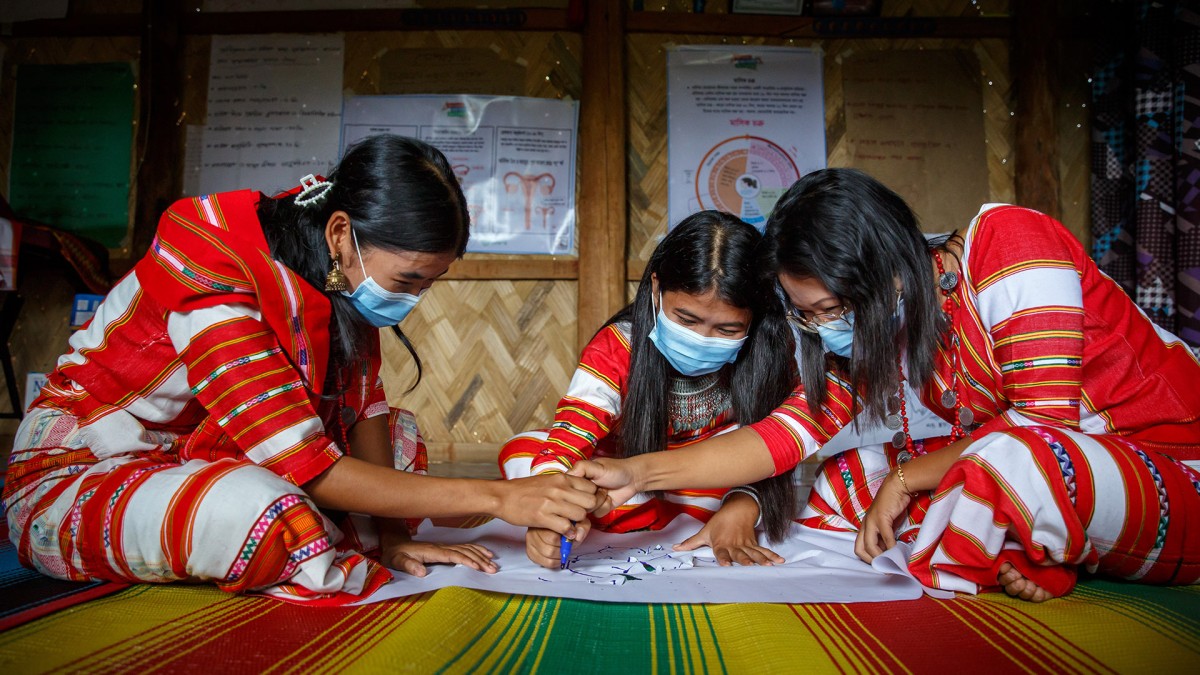Ending violence against indigenous women and girls in the Chittagong Hill Tracts, Bangladesh
Written by: Rimi Chakma, Sumit Banik & Nabaleswar Dewan
Master Trainers, Bangladesh Nari Progati Sangha (BNPS), Bangladesh
The Chittagong Hill Tracts (CHT) in southeast Bangladesh consisting of Rangamati, Bandarban and Khagrachari Hill districts, is the home of 11 different indigenous communities. Due to geographical remoteness, prolonged conflict for over two decades, and prevailing patriarchal social system, the indigenous women and girls are confronted with various kinds of gender-based violence.
In 2019, Simavi and Bangladesh Nari Progati Sangha (BNPS) funded by European Union, initiated a project in the hill tracts titled Our Lives, Our Health, Our Futures (Our LHF) programme: Empowering adolescent girls and young women (10-25 years) to live with dignity and without violence, in collaboration with 10 local non-government organizations.

Raising their voice through various forms of activism
Over the past four years, the programme has been working with 12,000 adolescent girls and young women in three hill districts to equip them with knowledge and skills about how to access services and legal aid to end violence. In addition, it capacitates them to raise their voice through activism on matters that affect their lives, and to make informed decisions on how to live with dignity and free from violence.
One of the initiatives of Our LHF programme is to train health service providers and Gender Focal Points to sensitize them about the needs and priorities of young women and adolescent girls. The aim is that they provide necessary quality services and act to prevent violence against women and girls while also support the clinics to offer basic required services. The Gender Focal Points are selected, key community leaders such as locally elected women members, female Karbari (traditional leader), headman (traditional leader), activists, teachers etc.
Responding to victims of violence
The health service providers were oriented on how to respond to a victim of violence at the healthcare facility using WHO guidelines and where to go to seek legal assistance as per standard referral procedure. The girls in the programme, who gather in the girl's club, are taken to the nearest health service centre to make them familiar with the health service providers and the clinics.
An orientation for the Gender Focal Point was conducted in each district where they were informed about the urgent situation of violence against indigenous women and girls in the CHT, barriers, and disparities to access to services and legal aid. They are trained in how they could play a role to prevent violence against indigenous women and girls and to help the victims of violence to access to services. Moreover, a series of meetings were held with the girls in the programme the Gender Focal Points so they would get to know each other and for the girls to know how to reach the Gender Focal Points when needed.
Preventing violence against girls
As we speak the Gender Focal Points have already started taking action to prevent violence against indigenous women and girls. One example is when a Gender Focal Point took action to stop sexual harassment at a public place, in response to a demand of some girls who were facing sexual harassment on the way to and from school. After consulting with the parents of the accused boys, the sexual harassment cases have stopped in the area. Other Gender Focal Points are getting information about the current situation of the girls in their respective areas.
It is also important to note that some traditional leaders (female Karbaris/ village heads) are working hard to ensure equal participation of women in the traditional institutions and social arbitration process of CHT. As their participation was very limited before, having female representatives contributes to a fairer decision-making process when it comes to cases of gender-based violence.
Throughout the year, a series of community sessions on Gender-Based violence, Sexual and Reproductive Health and Rights and child marriage were organized with fathers, mothers, brothers and community leaders to remove restrictive social norms. The programme gathers these groups together to motivate them to act on preventing violence against women and girls. Now many of them are contributing into bringing about positive changes to remove restrictive social norms and to prevent violence against women and girls in CHT.
For the future, the Gender Focal Points, health service providers and community leaders will foster actions to prevent violence against indigenous women and girls and access to services for the victims of violence, with their continued support and actions in favor of indigenous women and girls in the CHT. The girls in Our Lives, Our Health, Our Futures will continue raising their voices and take actions to prevent violence against indigenous women and girls so that they can live a life with dignity and without violence.
This article has been shared in support of the international campaign 16 Days of Activism Against Gender-Based Violence.


